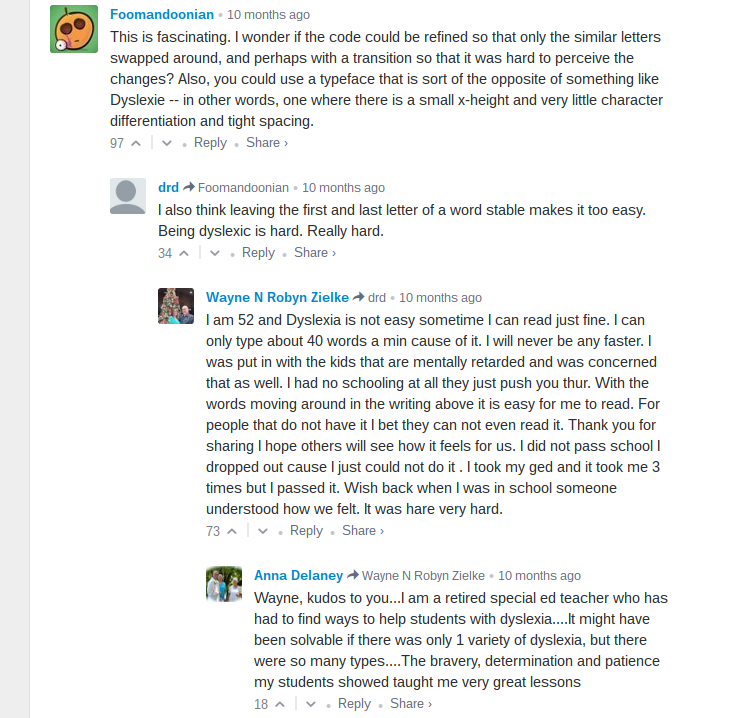You'll Understand What It's Like to Have Dyslexia After Trying to Read This

By:
What do Cher, Henry Winkler, and Orlando Bloom all have in common? According to Huffington Post, they all have the learning disorder dyslexia. The Mayo Clinic describes dyslexia as a learning disorder "characterized by difficulty reading due to problems identifying speech sounds and learning how they relate to letters and words," but it can be hard to understand what the disorder feels like for those trying to read.
The following GIF provides a visual of what reading with dyslexia is like, and may allow for a better understanding of how some people with the learning disorder can struggle.
The GIF above was created by developer Victor Widell, who made an entire animated website that attempts to give visitors the perspective of what reading is like for a person with dyslexia.
According to the Dyslexia Center of Utah, one in five students has a language-based learning disability, and dyslexia is the most common language-based learning disability.
Guinevere Eden, director of Georgetown University's Center for the Study of Learning, told writer Gabrielle Manuel in an NPR series on dyslexia that people with dyslexia have under-activated processing centers in their brains that cause them to struggle with reading. For example, every person's brain has to learn to distinguish between lowercase "b" and "d," but someone with dyslexia may not be able to accurately recognize them because they have two under-activated processing centers: the left temporoparietal cortex, which is for verbal language, and the occipitotemporal cortex, which is for processing visuals.
Another recent study from the Massachusetts Institute of Technology (MIT) found that people with dyslexia may have differences in sensory processing. The study found that those with dyslexia have reduced brain plasticity, which enables the brain to learn and adapt to new things.
“It’s a difference in the brain that’s not about reading per se, but it’s a difference in perceptual learning that’s pretty broad,” John Gabrieli, the lead author of the study, said in a news release. “This is a path by which a brain difference could influence learning to read, which involves so many demands on plasticity.”
Though there is no "cure" for dyslexia, the Mayo Clinic recommends putting learning and educational plans in place to improve the experience of reading for those with dyslexia. The Mayo Clinic suggests early intervention so that people with dyslexia can develop the skills they need earlier rather than later in life:
"Teachers may use techniques involving hearing, vision and touch to improve reading skills. Helping a child use several senses to learn — for example, listening to a taped lesson and tracing with a finger the shape of the letters used and the words spoken — can help him or her process the information. If available, tutoring sessions with a reading specialist can be very helpful for many children with dyslexia."
Several commenters on the dyslexia gif website noted other ways that dyslexia can impact reading and word processing:
 Geon Github - github.io
Geon Github - github.io
People with dyslexia face some misconceptions about their reading abilities and intelligence.
Writer Gabrielle Manuel explained in the second segment of her November project for NPR's "All Things Considered" that dyslexia is "deeply misunderstood," as some people might think that dyslexia is about lacking in intelligence, being a slow reader, or just having poor reading comprehension. Rather, the issue is about how words may appear to someone with dyslexia. Manuel asked a woman named Geva Lester, whose son Thomas has dyslexia, about the misconceptions Thomas faces. Lester said that Thomas' struggles have nothing to do with comprehension.
"His comprehension is that of a 13-year-old," Lester said. "He can understand Harry Potter, but he can't read it."
Manuel, who has dyslexia herself, added that people with dyslexia understand the meaning of words, but they may not be able to read those words.
"People with dyslexia don't naturally process the written word," Manuel wrote. "They don't easily break it into smaller units that can be turned into sounds and stitched together. Dyslexia causes many obstacles for reading. This makes reading a laborious — even exhausting — process."
[H/T GOOD]
